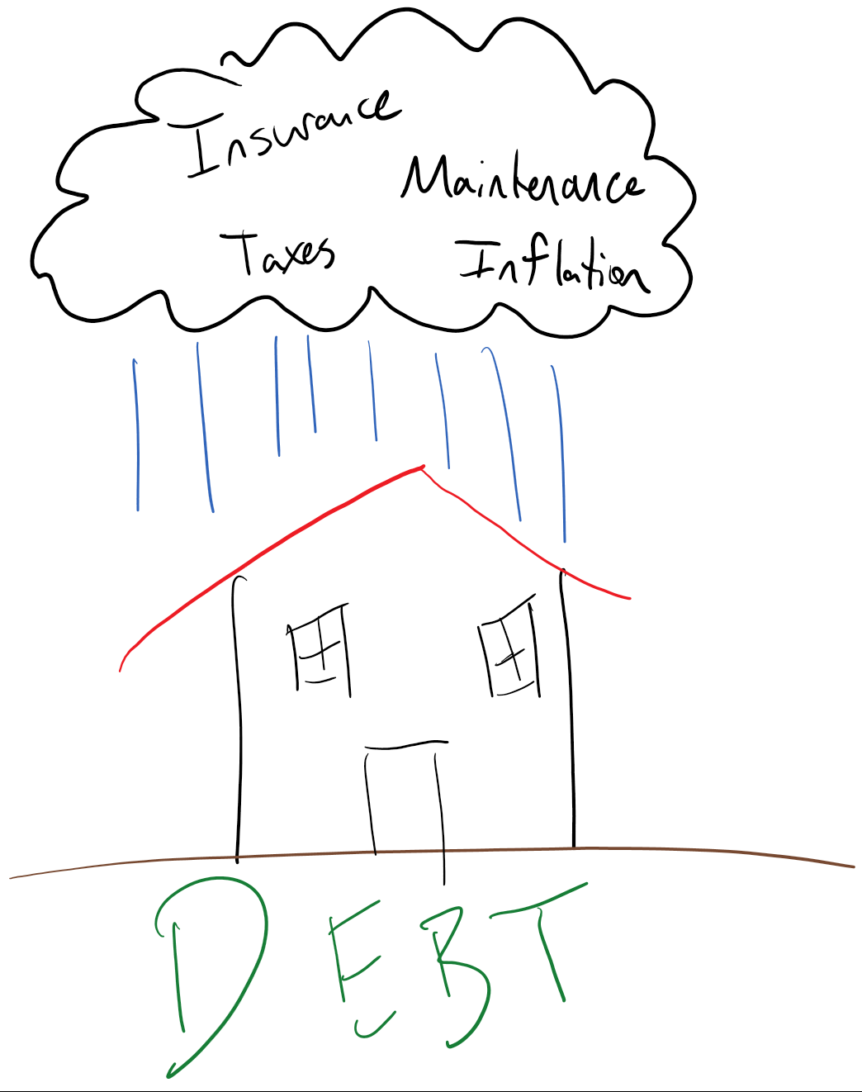A common debate or question for financial planners is whether it’s better to rent or buy a home. As with most things, it depends, but as a general rule, if you don’t intend to constantly move long distances (more frequently than every six years or so), it becomes a valuable wealth-building tool to own real estate. However, real estate is not the wealth-building panacea that banks and mortgage companies often make out to be. Real estate, even your residence, is a complicated investment vehicle that carries a larger than the average number of investment risks, as well as can stretch over the line from passive investment to a part-time job with the assorted chores and maintenance that come with living somewhere. However, it turns out; two things can be true at once. First: Your residence can be one of the lowest return investments you ever make. Second: Your residence can be one of the best investments you ever make. Naturally, these positions seem contradictory but let me explain.
Renting vs. Buying
The math on renting vs. buying is relatively straightforward. If you intend to move any more regularly than approximately six years at a time, renting is a better option for you. Between the costs of financing, acquisition, and selling your property in exchange for another property, trading your residence any more regularly than six years generates a high risk of loss. This comes as a result of the disproportionate risk of physical damage or repairs required in your home (a risk that is always present but is financially mitigated the longer you hold the home, even if it’s more likely to occur with time), the cost of the real estate transaction itself (mortgage closing costs, points, real estate broker commissions, listing costs, staging, and so on), and otherwise the fact that the first ten years of a mortgage you barely move the needle on paying down the principal of the loan. However, suppose you intend to live in the same spot for longer than six years. In that case, these costs begin to shrink rapidly in proportion to the compounding accumulation value, and concurrent inflation reduced the mortgage payment’s cash value.
Calculating the Real ROI
Let’s use a case study here. Let’s say you purchase a home today in the year 2020 for $350,000. The house has a 30 year fixed mortgage at 3% ($1,475.61 monthly payment), inflation is 2.5%, the home is going to appreciate at 6%, homeowner’s insurance will be .5% of the home value, and your maintenance costs are going to be 1% of the home value annually (which aren’t likely to happen in a perfectly linear fashion, but will happen in irregular and likely unplanned spikes as the furnace goes out or squirrels make a home in the attic.) For the sake of simplicity, we’ll be extra generous and leave property taxes out of the equation. Assuming that the mortgage and inflation rate environment remains stable (they won’t, but a 3% mortgage and 2.5% inflation is already very generous), the home will appreciate in 30 years to a value of $2,010,221.91! And this is where the “fake ROI” comes into play. People will do simple interest math and either divide that outcome by the purchase price (“I made 574% on my house!”) or do some slightly smarter math and still come up with the wrong result (“I made 6% on my house!”). Now I know what you’re thinking. “Dan, you told us the appreciation would be 6%!” And you’re right, I did. But that fails to consider the cost of the home purchase itself and the costs of maintaining the house. While the home’s face value has appreciated to over 2 million dollars, a couple of costs have undermined the whole endeavor. First, the total mortgage payments over 30 years wouldn’t merely be $350,000. With interest, the homeowner has paid $531,219.60 for their home. Second, they’ve also paid an additional $146,652.94 in homeowner’s insurance premiums (which hopefully have gone to waste and not incurred significant damage that requires repair!) Third, the ongoing maintenance of the home has cost the homeowners $293,305.87. All of this adds up to over $971,178.41 in homeowner’s costs against the $2,010,221.91 appreciated value. But wait, there’s more! You see, the home has appreciated in future dollars, which, due to our friend inflation at 2.5%, is only worth $958,358.58. When we update the figures for return, suddenly, after all those expenses, our annual return after mortgage, inflation, insurance, and maintenance was a measly 2.56%, barely more than inflation-protected federal treasury bonds over the past 30 years.
So Why Bother?
Well, for a few reasons. First, while renting is not wealth destroying like buying and selling your home too frequently, it is undoubtedly not wealth building. 2.56% is still higher than -2.5% by only spending your money on rent. Second, studies have shown time and time again that money that is not explicitly accounted for (i.e., put into a 401(k), paid into a mortgage, or set aside in a separate investment account) tends to end up spent. While ideas such as “buy term life insurance and invest the difference” are popular rules of thumb, they are rarely implemented. So while the return on a personal residence is typically not great, it does force a long term savings behavior that is ultimately wealth building. Thus where I pointed out earlier that two things can be true at once: Low return investment, one of the best investments. Additionally, this all is merely basing the potential return on the appreciated and inflation-adjusted value of the home after all the expenses. There is an additional return we haven’t talked about: inexhaustible retirement income.
Spending Your Equity
While homeowners regularly refinance, take out home equity lines of credit, and often set their real estate wealth accumulation back in practice, eventually, their home should be a debt-free residence other than insurance and property taxes (which would be nominal compared to the mortgage on day one!) However, home equity is a hidden asset very few homeowners utilize appropriately in retirement. Often, homeowners will deplete their retirement and liquid savings before turning to a downsize and liquidating (with a pile of taxes!) their home for additional retirement income. However, upon the age of 62, homeowners can utilize an often misunderstood tool: the reverse mortgage. In its simplest form, a reverse mortgage calculates the value of the home on the day of the mortgage, multiplies the value by 80%, applies an interest rate (for example, the same 3% we saw earlier), and then estimates the life expectancy of the borrowers. Using our example from earlier, if our homeowners were 62 on the day the mortgage was paid off and immediately turned it around into a reverse mortgage, they would receive monthly tax-free loans of $8,828.68 (equivalent to $3,970.64 today.) Then, when the homeowner(s) have passed away, the lender will sell the family home to recoup their loan. If the loan payments plus interest were less than the home’s value, then heirs will receive the remaining value as part of their inheritance. If the loan value ever reached or even exceeded the home’s value, the lender can only recoup up to the value of the home, no more. This is extra important if the longevity of the owners is likely to be significant, as the homeowners could potentially enjoy a decade or more of “extra” income on the value of their home while never having the loan come due in their lifetimes and leaving their heirs with no unreasonable amount of debt due to the security of the home.
Summing Things Up
Real estate is a complicated investment but an important one, particularly where one’s own home is concerned. Keeping your home well maintained, avoiding expensive renovation or upgrade projects, and refinancing whenever there’s an opportunity to reduce the home costs are valuable tools, as is merely staying in the same home for an extended period. While there are often temptations (a kitchen renovation, a cash-out refinance, and so on), it is best used as a very conservative accumulation tool for wealth. Excess cash should never be used to pay down the mortgage faster and should be deployed toward more aggressive higher return options to offset your home’s conservative wealth-building power. Finally, never forget that the value of the home you live in can provide significant tax-free income in retirement, supplementing existing liquid assets and social security benefits to provide a well-funded and well deserved period of financial freedom.

Dr. Daniel M. Yerger is the President of MY Wealth Planners®, a fee-only financial planning firm serving Longmont, CO’s accomplished professionals.


Comments 2
This article made sense to me. I have passed it on to someone who is wanting to buy when it appears that renting is the best option unless settled for years to come. Thanks
Pingback: Expanding the View of Household Wealth - Krishna Wealth Planning